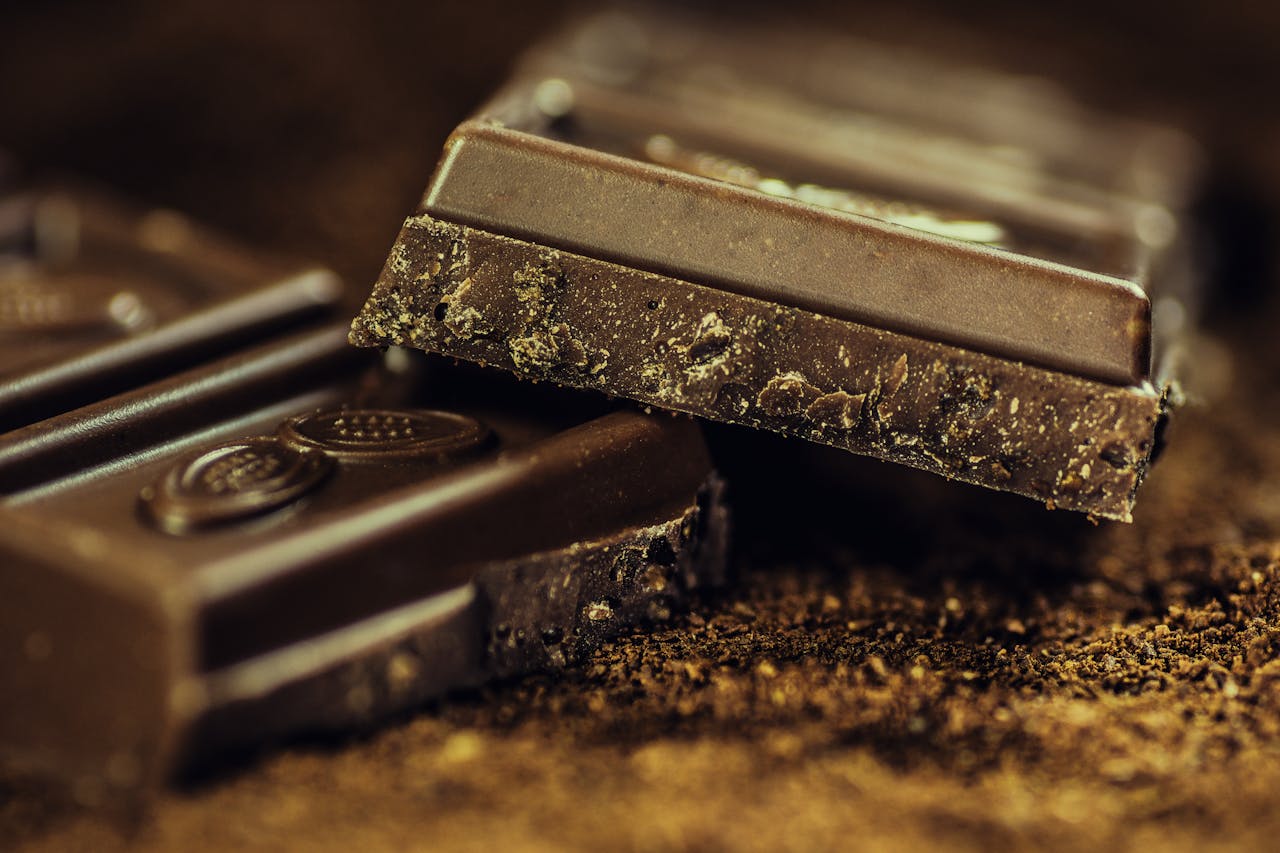Heart disease remains the leading cause of death globally, underscoring the urgent need for effective preventive strategies. Among the many factors influencing cardiovascular health, high cholesterol, arterial hardening, and damage from high blood pressure play critical roles. Medical professionals advocate for a combination of regular exercise and a heart-healthy diet, and emerging research highlights the benefits of antioxidants as a vital component in supporting the cardiovascular system
The Antioxidant Powerhouses: Cocoa, Green Tea, and Resveratrol
Antioxidants like epigallocatechin gallate (EGCG) found in green tea, procyanidins and epicatechins in pure cocoa, and resveratrol from red grapes have been extensively studied for their protective effects on heart health. Their effectiveness is largely determined by their antioxidant value, measured in ORAC (Oxygen Radical Absorbance Capacity) units. Raw cocoa tops the charts with an ORAC value of 26,000, followed by dark chocolate at 13,120. Green tea and red grapes have ORAC values of 1,220 and 750, respectively. These numbers reflect their potential to combat oxidative stress, a key factor in cardiovascular disease.
Fighting Atherosclerosis with Antioxidants
Research suggests that flavonoids from cocoa, green tea, and resveratrol enhance endothelial function by stimulating nitric oxide production. Nitric oxide relaxes blood vessels, promoting better circulation and reducing arterial stiffness—a hallmark of atherosclerosis. Moreover, these antioxidants help prevent the oxidation of LDL cholesterol, a process that accelerates plaque formation in arteries, thereby safeguarding against arterial blockages.
Myocardial Infarction: Antioxidant Support for Heart Recovery
Antioxidants like EGCG, procyanidins, and resveratrol play a role in protecting heart cells during and after a myocardial infarction (heart attack). They inhibit proteins responsible for inflammation and oxidative damage, reducing cell death and promoting recovery. Green tea, in particular, has been shown to aid in the faster recovery of heart function post-infarction, highlighting its therapeutic potential.
Coronary Artery Disease and Regular Antioxidant Intake
Consistent consumption of cocoa, green tea, and resveratrol-rich foods has been associated with reduced risk of coronary artery disease (CAD). These antioxidants improve blood flow, minimize oxidative damage, and exhibit anti-thrombotic properties, which reduce the likelihood of blood clots leading to strokes or heart attacks. Such cardio-protective benefits are pivotal in managing and preventing CAD.
Lowering Blood Pressure Naturally
Green tea and chocolate have demonstrated the ability to reduce hypertension risk. A study published in the Archives of Internal Medicine revealed that individuals who drank green tea regularly experienced a significantly lower risk of developing high blood pressure. Similarly, cocoa has been linked to improved vasodilation and reduced blood pressure, emphasizing its role in heart health.
Cholesterol Management with Antioxidants
Antioxidants found in cocoa, green tea, and resveratrol help regulate cholesterol by increasing liver LDL receptors. These receptors bind to LDL cholesterol (the "bad" cholesterol) and facilitate its elimination through the digestive system. This mechanism aids in maintaining optimal cholesterol levels, further supporting cardiovascular health.
Crafting a Heart-Healthy Beverage
The combination of cocoa, green tea, and resveratrol offers a potent drink for heart health. Such a blend combines the vasodilatory effects of green tea, the cholesterol-lowering properties of cocoa, and the anti-inflammatory benefits of resveratrol. With no added sugars or fats, this beverage can be a delicious and effective addition to a heart-conscious diet.
Practical Steps for Incorporating Antioxidants
Adding these powerful antioxidants to your diet is straightforward. Opt for dark chocolate with at least 70% cocoa content for maximum benefits. Enjoy green tea daily, aiming for 2–3 cups, and incorporate red grapes or moderate amounts of red wine for resveratrol. These small changes can yield significant long-term benefits for cardiovascular health.
A Sweet Solution for Heart Health
In the battle against heart disease, cocoa, green tea, and resveratrol stand out as nutritional allies. Their ability to improve circulation, lower cholesterol, and reduce oxidative stress positions them as essential components of a heart-healthy lifestyle. Coupled with regular exercise and a balanced diet, these antioxidants offer a tasty and scientifically backed approach to protecting your heart for years to come.
References:
1. Evidence that the antioxidant flavonoids in tea and cocoa are beneficial for cardiovascular health. Curr Opin Lipidol. 2002 Feb;13(1):41-9
2. Effects of cocoa flavanols on risk factors for cardiovascular disease, Asia Pac J Clin Nutr. 2008;17 Suppl 1:284-7. PMID: 18296357
Atherosclerosis
Green Tea
3. The acute effect of green tea consumption on endothelial function in healthy individuals. European Journal of Cardiovascular Prevention & Rehabilitation, 2008; 15 (3): 300 DOI: 10.1097/HJR.0b013e3282f4832f
4. Tea catechins inhibit cholesterol oxidation accompanying oxidation of low density lipoprotein in vitro. Comp Biochem Physiol C Toxicol Pharmacol. 2001 Feb;128(2):153-64.
5. Tea catechin consumption reduces circulating oxidized low-density lipoprotein. Int Heart J. 2007 Nov;48(6):725-32.
Chocolate
6. Proximate, Mineral and Procyanidin Content of Certain Foods and Beverages Consumed by the Kuna Amerinds of Panama J Food Cmpstn & Anal 2001;14:553-563.
Resveratrol
7. Resveratrol, a Polyphenolic Phytoalexin Present in Red Wine, Enhances Expression and Activity of Endothelial Nitric Oxide Synthase, Circulation. 2002;106:1652-1658, American Heart Association, Inc.
Myocardial Infarction
Green Tea
8. Epigallocatechin-3-gallate inhibits STAT-1 activation and protects cardiac myocytes from ischemia/reperfusion-induced apoptosis. FASEB J. 2004 Oct;18(13):1621-3. Epub 2004 Aug 19.
9. Possible contribution of green tea drinking habits to the prevention of stroke. Tohoku J Exp Med. 1989 Apr;157(4):337-43.
10. Protective effects of green tea catechins on cerebral ischemic damage. Med Sci Monit. 2004 Jun;10(6):BR166-74. Epub 2004 Jun 1.
11. Neuroprotective effects of (-)-epigallocatechin gallate following hypoxia-ischemia-induced brain damage: novel mechanisms of action. FASEB J. 2005 Feb;19(2):258-60. Epub 2004 Nov.
Chocolate
12. Antioxidants in chocolate. Lancet 1996;348:834.
13. Red wine, chocolate and vascular health: developing the evidence base, Heart 2008;94:821-823; doi:10.1136/hrt.2008.143909, British Cardiovascular Society
Resveratrol
14. Cardioprotective effect of resveratrol, a natural antioxidant derived from grapes, Cardiovascular Research 2000 47(3):549-555; doi:10.1016/S0008-6363(00)00102-4, European Society of Cardiology
15. Mechanism of cardioprotection by resveratrol, a phenolic antioxidant present in red wine, Int J Mol Med. 2001 Jul;8(1):3-17. PMID: 11408943.
Coronary Artery Disease
Green Tea
16.. Effects of green tea intake on the development of coronary artery disease. Circ J. 2004 Jul;68(7):665-70.
17. Relation between green tea consumption and the severity of coronary atherosclerosis among Japanese men and women. Ann Epidemiol. 2000 Aug;10(6):401-8.
18. The green tea, a good choice for cardiovascular disease prevention? Arch Latinoam Nutr. 2004 Dec;54(4):380-94.
19. Antithrombotic activities of green tea catechins and (-)-epigallocatechin gallate. Thromb Res. 1999 Nov 1;96(3):229-37.
Chocolate
20. Flavonoid intake and coronary mortality in Finland: a cohort study. Brit Med J 1996;312:478-81. Hertog M, Kromhout D, Aravanis C, et al.
21. Dietary antioxidant flavonoids and risk of coronary heart disease: the Zutphen Elderly Study. Lancet 1993;342:1007-11. Hollman PC, Hertog MGL, Katan MB.
22. Role of dietary flavonoids in protection against cancer and coronary heart disease. Biochem Soc Transact 1996;24:785-9. 5 Rein D, Paglieroni TG, Wun T, Pearson DA, Schmitz HH, Gosselin R, and Keen CL.
23. Cocoa inhibits platelet activation and function Am J Clin Nutr 2000;72:30-5.
24. Dark Chocolate Improves Coronary Vasomotion and Reduces Platelet Reactivity, Circulation. 2007;116:2376-2382, American Heart Association, Inc
25. Cocoa inhibits platelet activation and function, American Journal of Clinical Nutrition, Vol. 72, No. 1, 30-35, July 2000, American Society for Clinical Nutrition
Resveratrol
26. Resveratrol attenuates TNF- -induced activation of coronary arterial endothelial cells: role of NF- B inhibition, Am J Physiol Heart Circ Physiol 291: H1694-H1699, 2006.
Blood Pressure
Green Tea
27. Epigallocatechin gallate, a green tea polyphenol, mediates NO-dependent vasodilation using signaling pathways in vascular endothelium requiring reactive oxygen species and Fyn. J Biol Chem. 2007 May 4;282(18):13736-45. Epub 2007 Mar 15.
28. Prevention of hypertension, cardiovascular damage and endothelial dysfunction with green tea extracts. Am J Hypertens. 2007 Dec;20(12):1321-8.
29. The protective effect of habitual tea consumption on hypertension. Arch Intern Med. 2004 Jul 26;164(14):1534-40.
Chocolate
30. Cocoa Reduces Blood Pressure and Insulin Resistance and Improves Endothelium-Dependent Vasodilation in Hypertensives, Hypertension. 2005;46:398-405, American Heart Association, Inc.
Lowering Bad Cholesterol
Green Tea
31. Relation of green tea consumption to serum lipids and lipoproteins in Japanese men. J Epidemiol. 1996 Sep;6(3):128-33.
32. Cholesterol-lowering effect of a theaflavin-enriched green tea extract: a randomized controlled trial. Arch Intern Med. 2003 Jun 23;163(12):1448-53.
33. Effectiveness of moderate green tea consumption on antioxidative status and plasma lipid profile in humans. J Nutr Biochem. 2005 Mar;16(3):144-9.
Chocolate
34. Penn State (2001, October 24). Cocoa And Dark Chocolate Show Positive Effects On Ldls – But Don't Shun Veggies. ScienceDaily.












